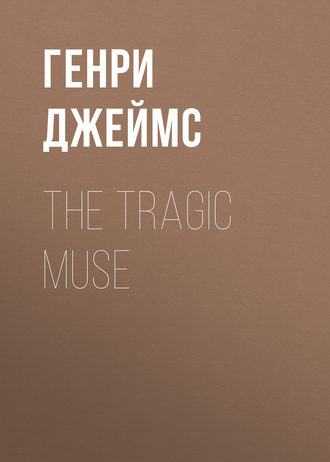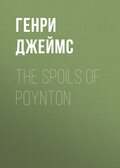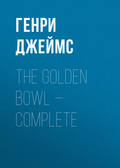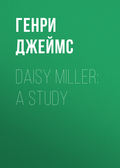
Генри Джеймс
The Tragic Muse
XXIII
It was certainly singular, in the light of other matters, that on sitting down in his studio after she had left town Nick should not, as regards the effort to project plastically some beautiful form, have felt more chilled by the absence of a friend who was such an embodiment of beauty. She was away and he missed her and longed for her, and yet without her the place was more filled with what he wanted to find in it. He turned into it with confused feelings, the strongest of which was a sense of release and recreation. It looked blighted and lonely and dusty, and his old studies, as he rummaged them out, struck him even as less inspired than the last time he had ventured to face them. But amid this neglected litter, in the colourless and obstructed light of a high north window which needed washing, he came nearer tasting the possibility of positive happiness: it appeared to him that, as he had said to Julia, he was more in possession of his soul. It was frivolity and folly, it was puerility, to spend valuable hours pottering over the vain implements of an art he had relinquished; and a certain shame that he had felt in presenting his plea to Julia that Sunday night arose from the sense not of what he clung to, but of what he had given up. He had turned his back on serious work, so that pottering was now all he could aspire to. It couldn't be fruitful, it couldn't be anything but ridiculous, almost ignoble; but it soothed his nerves, it was in the nature of a secret dissipation. He had never suspected he should some day have nerves on his own part to count with; but this possibility had been revealed to him on the day it became clear that he was letting something precious go. He was glad he had not to justify himself to the critical, for this might have been a delicate business. The critical were mostly absent; and besides, shut up all day in his studio, how should he ever meet them? It was the place in the world where he felt furthest away from his constituents. That was a part of the pleasure—the consciousness that for the hour the coast was clear and his mind independent. His mother and his sister had gone to Broadwood: Lady Agnes—the phrase sounds brutal but represents his state of mind—was well out of the way. He had written to her as soon as Julia left town—he had apprised her of the fact that his wedding-day was fixed: a relief for poor Lady Agnes to a period of intolerable mystification, of dark, dumb wondering and watching. She had said her say the day of the poll at Harsh; she was too proud to ask and too discreet to "nag"; so she could only wait for something that didn't come. The unconditioned loan of Broadwood had of course been something of a bribe to patience: she had at first felt that on the day she should take possession of that capital house Julia would indeed seem to have entered the family. But the gift had confirmed expectations just enough to make disappointment more bitter; and the discomfort was greater in proportion as she failed to discover what was the matter. Her daughter Grace was much occupied with this question, and brought it up for discussion in a manner irritating to her ladyship, who had a high theory of being silent about it, but who, however, in the long run, was more unhappy when, in consequence of a reprimand, the girl suggested no reasons at all than when she suggested stupid ones. It eased Lady Agnes a little to advert to the mystery when she could have the air of not having begun.
The letter Nick received from her the first day of Passion Week in reply to his important communication was the only one he read at that moment; not counting of course the several notes Mrs. Dallow addressed to him from Griffin. There were letters piled up, as he knew, in Calcutta Gardens, which his servant had strict orders not to bring to the studio. Nick slept now in the bedroom attached to this retreat; got things, as he wanted them, from Calcutta Gardens; and dined at his club, where a stray surviving friend or two, seeing him prowl about the library in the evening, was free to impute to such eccentricity some subtly political basis. When he thought of his neglected letters he remembered Mr. Carteret's convictions on the subject of not "getting behind"; they made him laugh, in the slightly sonorous painting-room, as he bent over one of the old canvases that he had ventured to turn to the light. He was fully determined, however, to master his correspondence before going down, the last thing before Parliament should reassemble, to spend another day at Beauclere. Mastering his correspondence meant, in Nick's mind, breaking open envelopes; writing answers was scarcely involved in the idea. But Mr. Carteret would never guess that. Nick was not moved even to write to him that the affair with Julia was on the point of taking the form he had been so good as to desire: he reserved the pleasure of this announcement for a personal interview.
The day before Good Friday, in the morning, his stillness was broken by a rat-tat-tat on the outer door of his studio, administered apparently by the knob of a walking-stick. His servant was out and he went to the door, wondering who his visitor could be at such a time, especially of the rather presuming class. The class was indicated by the visitor's failure to look for the bell—since there was a bell, though it required a little research. In a moment the mystery was solved: the gentleman who stood smiling at him from the threshold could only be Gabriel Nash. Nick had not seen this whimsical personage for several months, and had had no news of him beyond a general intimation that he was following his fancy in foreign parts. His old friend had sufficiently prepared him, at the time of their reunion in Paris, for the idea of the fitful in intercourse; and he had not been ignorant, on his return from Paris, that he should have had an opportunity to miss him if he had not been too busy to take advantage of it. In London, after the episode at Harsh, Gabriel had not reappeared: he had redeemed none of the pledges given the night they walked together to Notre Dame and conversed on important matters. He was to have interposed in Nick's destiny, but he had not interposed; he was to have pulled him hard and in the opposite sense from Julia, but there had been no pulling; he was to have saved him, as he called it, and yet Nick was lost. This circumstance indeed formed his excuse: the member for Harsh had rushed so wantonly to perdition. Nick had for the hour seriously wished to keep hold of him: he valued him as a salutary influence. Yet on coming to his senses after his election our young man had recognised that Nash might very well have reflected on the thanklessness of such a slippery subject—might have held himself released from his vows. Of course it had been particularly in the event of a Liberal triumph that he had threatened to make himself felt; the effect of a brand plucked from the burning would be so much greater if the flames were already high. Yet Nick had not kept him to the letter of this pledge, and had so fully admitted the right of a thorough connoisseur, let alone a faithful friend, to lose patience with him that he was now far from greeting his visitor with a reproach. He felt much more thrown on his defence.
Gabriel, however, forbore at first to attack him. He brought in only blandness and benevolence and a great content at having obeyed the mystic voice—it was really a remarkable case of second sight—which had whispered him that the recreant comrade of his prime was in town. He had just come back from Sicily after a southern winter, according to a custom frequent with him, and had been moved by a miraculous prescience, unfavourable as the moment might seem, to go and ask for Nick in Calcutta Gardens, where he had extracted from his friend's servant an address not known to all the world. He showed Nick what a mistake it had been to fear a dull arraignment, and how he habitually ignored all lapses and kept up the standard only by taking a hundred fine things for granted. He also abounded more than ever in his own sense, reminding his relieved listener how no recollection of him, no evocation of him in absence, could ever do him justice. You couldn't recall him without seeming to exaggerate him, and then acknowledged, when you saw him, that your exaggeration had fallen short. He emerged out of vagueness—his Sicily might have been the Sicily of A Winter's Tale—and would evidently be reabsorbed in it; but his presence was positive and pervasive enough. He was duly "intense" while he lasted. His connexions were with beauty, urbanity and conversation, as usual, but they made up a circle you couldn't find in the Court Guide. Nick had a sense that he knew "a lot of esthetic people," but he dealt in ideas much more than in names and addresses. He was genial and jocose, sunburnt and romantically allusive. It was to be gathered that he had been living for many days in a Saracenic tower where his principal occupation was to watch for the flushing of the west. He had retained all the serenity of his opinions and made light, with a candour of which the only defect was apparently that it was not quite enough a conscious virtue, of many of the objects of common esteem. When Nick asked him what he had been doing he replied, "Oh living, you know"; and the tone of the words offered them as the story of a great deed. He made a long visit, staying to luncheon and after luncheon, so that the little studio heard all at once a greater quantity of brave talk than in the several previous years of its history. With much of our tale left to tell it is a pity that so little of this colloquy may be reported here; since, as affairs took their course, it marked really—if the question be of noting the exact point—a turn of the tide in Nick Dormer's personal situation. He was destined to remember the accent with which Nash exclaimed, on his drawing forth sundry specimens of amateurish earnestness:
"I say—I say—I say!"
He glanced round with a heightened colour. "They're pretty bad, eh?"
"Oh you're a deep one," Nash went on.
"What's the matter?"
"Do you call your conduct that of a man of honour?"
"Scarcely perhaps. But when no one has seen them—!"
"That's your villainy. C'est de l'exquis, du pur exquis. Come, my dear fellow, this is very serious—it's a bad business," said Gabriel Nash. Then he added almost with austerity: "You'll be so good as to place before me every patch of paint, every sketch and scrap, that this room contains."
Nick complied in great good humour. He turned out his boxes and drawers, shovelled forth the contents of bulging portfolios, mounted on chairs to unhook old canvases that had been severely "skied." He was modest and docile and patient and amused, above all he was quite thrilled—thrilled with the idea of eliciting a note of appreciation so late in the day. It was the oddest thing how he at present in fact found himself imputing value to his visitor—attributing to him, among attributions more confused, the dignity of judgement, the authority of knowledge. Nash was an ambiguous character but an excellent touchstone. The two said very little for a while, and they had almost half an hour's silence, during which, after our young man had hastily improvised an exhibition, there was only a puffing of cigarettes. Gabriel walked about, looking at this and that, taking up rough studies and laying them down, asking a question of fact, fishing with his umbrella, on the floor, amid a pile of unarranged sketches. Nick accepted jocosely the attitude of suspense, but there was even more of it in his heart than in his face. So few people had seen his young work—almost no one who really counted. He had been ashamed of it, never showing it to bring on a conclusion, since a conclusion was precisely what he feared. He whistled now while he let his companion take time. He rubbed old panels with his sleeve and dabbed wet sponges on surfaces that had sunk. It was a long time since he had felt so gay, strange as such an assertion sounds in regard to a young man whose bridal-day had at his urgent solicitation lately been fixed. He had stayed in town to be alone with his imagination, and suddenly, paradoxically, the sense of that result had arrived with poor Nash.
"Nicholas Dormer," this personage remarked at last, "for grossness of immorality I think I've never seen your equal."
"That sounds so well," Nick returned, "that I hesitate to risk spoiling it by wishing it explained."
"Don't you recognise in any degree the grand idea of duty?"
"If I don't grasp it with a certain firmness I'm a deadly failure, for I was quite brought up on it," Nick said.
"Then you're indeed the wretchedest failure I know. Life is ugly, after all."
"Do I gather that you yourself recognise obligations of the order you allude to?"
"Do you 'gather'?" Nash stared. "Why, aren't they the very flame of my faith, the burden of my song?"
"My dear fellow, duty is doing, and I've inferred that you think rather poorly of doing—that it spoils one's style."
"Doing wrong, assuredly."
"But what do you call right? What's your canon of certainty there?" Nick asked.
"The conscience that's in us—that charming, conversible, infinite thing, the intensest thing we know. But you must treat the oracle civilly if you wish to make it speak. You mustn't stride into the temple in muddy jack-boots and with your hat on your head, as the Puritan troopers tramped into the dear old abbeys. One must do one's best to find out the right, and your criminality appears to be that you've not taken the commonest trouble."
"I hadn't you to ask," smiled Nick. "But duty strikes me as doing something in particular. If you're too afraid it may be the wrong thing you may let everything go."
"Being is doing, and if doing is duty being is duty. Do you follow?"
"At a very great distance."
"To be what one may be, really and efficaciously," Nash went on, "to feel it and understand it, to accept it, adopt it, embrace it—that's conduct, that's life."
"And suppose one's a brute or an ass, where's the efficacy?"
"In one's very want of intelligence. In such cases one's out of it—the question doesn't exist; one simply becomes a part of the duty of others. The brute, the ass," Nick's visitor developed, "neither feels nor understands, nor accepts nor adopts. Those fine processes in themselves classify us. They educate, they exalt, they preserve; so that to profit by them we must be as perceptive as we can. We must recognise our particular form, the instrument that each of us—each of us who carries anything—carries in his being. Mastering this instrument, learning to play it in perfection—that's what I call duty, what I call conduct, what I call success."
Nick listened with friendly attention and the air of general assent was in his face as he said: "Every one has it then, this individual pipe?"
"'Every one,' my dear fellow, is too much to say, for the world's full of the crudest remplissage. The book of life's padded, ah but padded—a deplorable want of editing! I speak of every one who's any one. Of course there are pipes and pipes—little quavering flutes for the concerted movements and big cornets-à-piston for the great solos."
"I see, I see. And what might your instrument be?"
Nash hesitated not a moment; his answer was radiantly there. "To speak to people just as I'm speaking to you. To prevent for instance a great wrong being done."
"A great wrong—?"
"Yes—to the human race. I talk—I talk; I say the things other people don't, the things they can't the things they won't," Gabriel went on with his inimitable candour.
"If it's a question of mastery and perfection you certainly have them," his companion replied.
"And you haven't, alas; that's the pity of it, that's the scandal. That's the wrong I want to set right before it becomes too public a shame. If I called you just now grossly immoral it's on account of the spectacle you present—a spectacle to be hidden from the eye of ingenuous youth: that of a man neglecting his own fiddle to blunder away on that of one of his fellows. We can't afford such mistakes, we can't tolerate such licence."
"You think then I have a fiddle?"—and our young man, in spite of himself, attached to the question a quaver of suspense finer, doubtless, than any that had ever passed his lips.
"A regular Stradivarius! All these things you've shown me are remarkably interesting. You've a talent of a wonderfully pure strain."
"I say—I say—I say!" Nick exclaimed, hovering there with his hands in his pockets and a blush on his lighted face, while he repeated with a change of accent Nash's exclamation of half an hour before.
"I like it, your talent; I measure it, I appreciate it, I insist upon it," that critic went on between the whiffs of his cigarette. "I have to be awfully wise and good to do so, but fortunately I am. In such a case that's my duty. I shall make you my business for a while. Therefore," he added piously; "don't say I'm unconscious of the moral law."
"A Stradivarius?" said Nick interrogatively and with his eyes wide open. The thought in his mind was of how different this seemed from his having gone to Griffin.
XXIV
His counsellor had plenty of further opportunity to develop this and other figurative remarks, for he not only spent several of the middle hours of the day at the studio, but came back in the evening—the pair had dined together at a little foreign pothouse in Soho, revealed to Nick on this occasion—and discussed the great question far into the night. The great question was whether, on the showing of those examples of his ability with which the scene of their discourse was now densely bestrewn, Nick Dormer would be justified in "really going in" for the practice of pictorial art. This may strike many readers of his history as a limited and even trivial inquiry, with little of the heroic or the romantic in it; but it was none the less carried to the finest point by our impassioned young men. Nick suspected Nash of exaggerating his encouragement in order to play a malign trick on the political world at whose expense it was his fond fancy to divert himself—without indeed making that organisation perceptibly totter—and reminded him that his present accusation of immorality was strangely inconsistent with the wanton hope expressed by him in Paris, the hope that the Liberal candidate at Harsh would be returned. Nash replied, first, "Oh I hadn't been in this place then!" but he defended himself later and more effectually by saying that it was not of Nick's having got elected he complained: it was of his visible hesitancy to throw up his seat. Nick begged that he wouldn't mention this, and his gallantry failed to render him incapable of saying: "The fact is I haven't the nerve for it." They talked then for a while of what he could do, not of what he couldn't; of the mysteries and miracles of reproduction and representation; of the strong, sane joys of the artistic life. Nick made afresh, with more fulness, his great confession, that his private ideal of happiness was the life of a great painter of portraits. He uttered his thought on that head so copiously and lucidly that Nash's own abundance was stilled and he listened almost as if he had been listening to something new—difficult as it was to conceive a point of view for such a matter with which he was unacquainted.
"There it is," said Nick at last—"there's the naked, preposterous truth: that if I were to do exactly as I liked I should spend my years reproducing the more or less vacuous countenances of my fellow-mortals. I should find peace and pleasure and wisdom and worth, I should find fascination and a measure of success in it—out of the din and the dust and the scramble, the world of party labels, party cries, party bargains and party treacheries: of humbuggery, hypocrisy and cant. The cleanness and quietness of it, the independent effort to do something, to leave something which shall give joy to man long after the howling has died away to the last ghost of an echo—such a vision solicits me in the watches of night with an almost irresistible force."
As he dropped these remarks he lolled on a big divan with one of his long legs folded up, while his visitor stopped in front of him after moving about the room vaguely and softly, almost on tiptoe, so as not to interrupt him. "You speak," Nash said, "with the special and dreadful eloquence that rises to a man's lips when he has practically, whatever his theory may be, renounced the right and dropped hideously into the wrong. Then his regret for the right, a certain exquisite appreciation of it, puts on an accent I know well how to recognise."
Nick looked up at him a moment. "You've hit it if you mean by that that I haven't resigned my seat and that I don't intend to."
"I thought you took it only to give it up. Don't you remember our talk in Paris?"
"I like to be a part of the spectacle that amuses you," Nick returned, "but I could scarcely have taken so much trouble as that for it."
"Isn't it then an absurd comedy, the life you lead?"
"Comedy or tragedy—I don't know which; whatever it is I appear to be capable of it to please two or three people."
"Then you can take trouble?" said Nash.
"Yes, for the woman I'm to marry."
"Oh you're to marry?"
"That's what has come on since we met in Paris," Nick explained, "and it makes just the difference."
"Ah my poor friend," smiled Gabriel, much arrested, "no wonder you've an eloquence, an accent!"
"It's a pity I have them in the wrong place. I'm expected to have them in the House of Commons."
"You will when you make your farewell speech there—to announce that you chuck it up. And may I venture to ask who's to be your wife?" the visitor pursued.
"Mrs. Dallow has kindly consented to accept that yoke. I think you saw her in Paris."
"Ah yes: you spoke of her to me, and I remember asking you even then if you were in love with her."
"I wasn't then," said Nick.
Nash had a grave pause. "And are you now?"
"Oh dear, yes."
"That would be better—if it wasn't worse."
"Nothing could be better," Nick declared. "It's the best thing that can happen to me."
"Well," his friend continued, "you must let me very respectfully approach this lady. You must let me bring her round."
"Bring her round to what?"
"To everything. Talk her over."
"Talk her under!" Nick laughed—but making his joke a little as to gain time. He remembered the effect this adviser had produced on Julia—an effect that scantly ministered to the idea of another meeting. Julia had had no occasion to allude again to Nick's imperturbable friend; he had passed out of her life at once and for ever; but there flickered up a quick memory of the contempt he had led her to express, together with a sense of how odd she would think it her intended should have thrown over two pleasant visits to cultivate such company.
"Over to a proper pride in what you may do," Nash returned—"what you may do above all if she'll help you."
"I scarcely see how she can help me," said Nick with an air of thinking.
"She's extremely handsome as I remember her. You could do great things with her."
"Ah, there's the rub," Nick went on. "I wanted her to sit for me this week, but she wouldn't hear of it."
"Elle a bien tort. You should attack some fine strong type. Is Mrs. Dallow in London?" Nash inquired.
"For what do you take her? She's paying visits."
"Then I've a model for you."
"Then you have—?" Nick stared. "What has that to do with Mrs. Dallow's being away?"
"Doesn't it give you more time?"
"Oh the time flies!" sighed Nick with a spontaneity that made his companion again laugh out—a demonstration in which for a moment he himself rather ruefully joined.
"Does she like you to paint?" that personage asked with one of his candid intonations.
"So she says."
"Well, do something fine to show her."
"I'd rather show it to you," Nick confessed.
"My dear fellow, I see it from here—if you do your duty. Do you remember the Tragic Muse?" Nash added for explanation.
"The Tragic Muse?"
"That girl in Paris, whom we heard at the old actress's and afterwards met at the charming entertainment given by your cousin—isn't he?—the secretary of embassy."
"Oh Peter's girl! Of course I remember her."
"Don't call her Peter's; call her rather mine," Nash said with easy rectification. "I invented her. I introduced her. I revealed her."
"I thought you on the contrary ridiculed and repudiated her."
"As a fine, handsome young woman surely not—I seem to myself to have been all the while rendering her services. I said I disliked tea-party ranters, and so I do; but if my estimate of her powers was below the mark she has more than punished me."
"What has she done?" Nick asked.
"She has become interesting, as I suppose you know."
"How should I know?"
"Well, you must see her, you must paint her," Nash returned. "She tells me something was said about it that day at Madame Carré's."
"Oh I remember—said by Peter."
"Then it will please Mr. Sherringham—you'll be glad to do that. I suppose you know all he has done for Miriam?" Gabriel pursued.
"Not a bit, I know nothing about Peter's affairs," Nick said, "unless it be in general that he goes in for mountebanks and mimes and that it occurs to me I've heard one of my sisters mention—the rumour had come to her—that he has been backing Miss Rooth."
"Miss Rooth delights to talk of his kindness; she's charming when she speaks of it. It's to his good offices that she owes her appearance here."
"Here?" Nick's interest rose. "Is she in London?"
"D'où tombez-vous? I thought you people read the papers."
"What should I read, when I sit—sometimes—through the stuff they put into them?"
"Of course I see that—that your engagement at your own variety-show, with its interminable 'turns,' keeps you from going to the others. Learn then," said Gabriel Nash, "that you've a great competitor and that you're distinctly not, much as you may suppose it, the rising comedian. The Tragic Muse is the great modern personage. Haven't you heard people speak of her, haven't you been taken to see her?"
Nick bethought himself. "I daresay I've heard of her, but with a good many other things on my mind I had forgotten it."
"Certainly I can imagine what has been on your mind. She remembers you at any rate; she repays neglect with sympathy. She wants," said Nash, "to come and see you."
"'See' me?" It was all for Nick now a wonder.
"To be seen by you—it comes to the same thing. She's really worth seeing; you must let me bring her; you'll find her very suggestive. That idea that you should paint her—she appears to consider it a sort of bargain."
"A bargain?" Our young man entered, as he believed, into the humour of the thing. "What will she give me?"
"A splendid model. She is splendid."
"Oh then bring her," said Nick.







